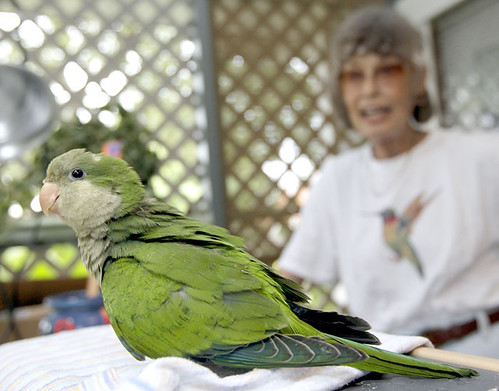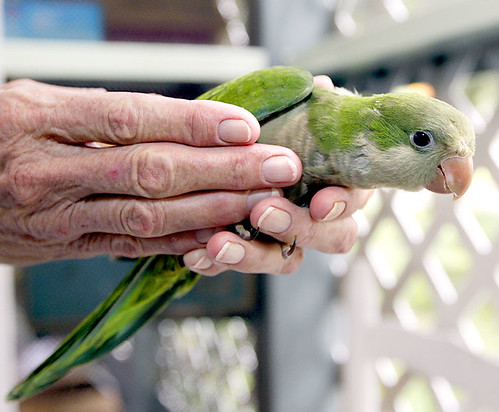 A quaker parrot, also known as a monk parakeet, rests Friday at the Texas City home of Trudy Belz. The young bird was found by Toni Jo Lindstrom on Thursday morning on her back porch in Bayou Vista.
A quaker parrot, also known as a monk parakeet, rests Friday at the Texas City home of Trudy Belz. The young bird was found by Toni Jo Lindstrom on Thursday morning on her back porch in Bayou Vista.
BAYOU VISTA — A Bayou Vista resident found an unexpected guest Thursday morning on her porch in the form of a parrot.
Toni Jo Lindstrom had stepped outside to hang laundry when she found the bird, which, according to a local wildlife authority, is a quaker parrot, also known as a monk parakeet.
The parrot appeared to be injured, Lindstrom said.
Lindstrom wrapped the parrot in a dishtowel and brought it inside her house.
“I thought maybe the soft cloth would be better than my hand,” she said. “I didn’t want to scare him, and I didn’t know how to handle him.”
Lindstrom sequestered the parrot in her sunroom with water and a cracker.
The bird did not seem to be an escaped pet, said Lindstrom, who guessed it might be a member of a colony of wild parrots that a friend had spotted in San Leon. Lindstrom had never noticed the species in the area.
“There’s seagulls, and there’s birds around all the time, but I just haven’t seen these little, green parrots,” she said.
Lindstrom hoped to find someone to take the parrot in, she said.
“I’m not a birder, and I don’t know anything about them,” Lindstrom said. “I’ve been trying all morning to find somebody.”
The bird seemed to have broken either its leg or its wing, she said. The emergency clinic wouldn’t accept the parrot, and Lindstrom was reluctant to turn it over to an animal shelter.
“It’s mostly cats and dogs” she said. “I wanted to see if I could find someone that could help.”
Lindstrom contacted Trudy Belz, who runs a bird sanctuary out of her Texas City home.
The wildlife rehabilitator said that she would be happy to accept the parrot into her sanctuary. Belz has been taking in sick and injured animals since 1990.
The parrot does not appear to be seriously injured, Belz said.
 Trudy Belz holds an injured quaker parrot that she is rehabilitating at her Texas City home.“He’s actually just weak from being in a starving condition,” she said, adding that the recent drought conditions may have played a role in the bird’s condition. The parrot was being treated with fluids and heat, and was expected to make a full recovery, Belz said.
Trudy Belz holds an injured quaker parrot that she is rehabilitating at her Texas City home.“He’s actually just weak from being in a starving condition,” she said, adding that the recent drought conditions may have played a role in the bird’s condition. The parrot was being treated with fluids and heat, and was expected to make a full recovery, Belz said.
Despite Lindstrom’s belief that the parrot was a member of a wild flock, Belz said that it might be a pet that was abandoned or got out of its cage.
“It could be that it escaped from the neighbors,” said Belz. “If I determine that he is indeed wild, he’ll be released back to that same nesting area.”
Quaker parrots are native to Central and South America, according to online sources.
The wildlife rehabilitator said she planned to house the bird for six weeks, in order to make sure it regained its health and was stable enough to survive on its own again.
Caroline Dorsett-Pate, executive director at the Galveston Island Humane Society, said that experts like Belz were the best option for dealing with injured or sick wildlife because they have more experience caring for that type of animal.
“It’s obviously most important if you find an animal, whether it be hurt or even not hurt ... that you contact someone who deals with that species,” she said. The Humane Society works closely with wildlife rehabilitators when wild birds and other creatures are brought to the shelter.
“With a parrot, you would contact someone who works with birds, or if it’s a opossum, we have wildlife rehabilitators who work with those,” she said.
The Humane Society has accepted similar birds in the past, Dorsett-Pate said, citing one instance in which the shelter was able to reunite a lost macaw with its owner.
If a wild animal or bird appears on someone’s property appears to be uninjured, Dorsett-Pate suggested leaving it alone. However, animals used to life as a pet or injured creatures need attention, she said.
“If we feel like it might be injured, we would take it to Trudy Belz,” Dorsett-Pate said. “She’s fabulous, she knows everything about birds, so if we get any bird, whether it be something we think might have been a pet, or any wildlife, that’s the person we go to.”
Animal shelters and other groups were happy to put people in touch with the appropriate experts if they do not know who to contact, Dorsett-Pate said.
“We’re lucky that we have a good supply of people that we can go to,” she said.